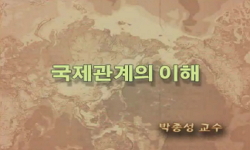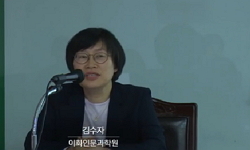이 글은 해방 이후 월북에 이르기까지 이태준의 행적과 글을 다시 점검하여 그의 월북 전후의 맥락을 구명하고자 했다. 그가 ‘순수문학’을 하다가 갑자기 변신하여 월북한 것이 아니고 해...
http://chineseinput.net/에서 pinyin(병음)방식으로 중국어를 변환할 수 있습니다.
변환된 중국어를 복사하여 사용하시면 됩니다.
- 中文 을 입력하시려면 zhongwen을 입력하시고 space를누르시면됩니다.
- 北京 을 입력하시려면 beijing을 입력하시고 space를 누르시면 됩니다.
https://www.riss.kr/link?id=A108916099
-
저자
박진숙 (충북대학교)
- 발행기관
- 학술지명
- 권호사항
-
발행연도
2023
-
작성언어
Korean
-
주제어
이태준 ; 해방 ; 월북 ; 진정한 예술가 ; 소련기행 ; Yi Tae-Jun ; Liberation ; defect to North Korea ; true artist ; Accounts of the Visit to the USSR
-
등재정보
KCI등재
-
자료형태
학술저널
-
수록면
461-491(31쪽)
- DOI식별코드
- 제공처
-
0
상세조회 -
0
다운로드
부가정보
국문 초록 (Abstract)
해방 이후 이태준의 행보와 관련하여 이제까지 밝혀지지 않았던 내용을 확인 후 연대기 순으로 연보를 정확히 작성해보았다. 이태준은 일제 말부터 세계사적 변화과정에 관심이 있었고 해방이 되자 민족문화건설 중앙협의회, 조선문학가동맹, 민주주의민족전선의 조직에 참가하며, 문학가동맹 부위원장, 민전 문화부장, 현대일보 주간, 조소문화협회 발기인, 조미문화협회 부회장을 맡는다. 1946년 8월 10일 소련기행을 떠났다가 북한에 체재하게 되면서 결과론적인 월북이 되는 과정을 밝혔다. 이태준은 문학과 정치에 대해 쓰면서 해방정국의 진정한 예술가는 이데올로기적인 비판을 받더라도 끊임없이 성찰하며 앞으로 나아가야 한다는 점을 세계의 예술가를 들어 설명했다. 『소련기행』에 나오는 고리키의 『밤주막』 중 한 청년의 이야기는 이태준 자신의 행방을 예측이라도 한 듯하다.
이 글은 해방 이후 월북에 이르기까지 이태준의 행적과 글을 다시 점검하여 그의 월북 전후의 맥락을 구명하고자 했다. 그가 ‘순수문학’을 하다가 갑자기 변신하여 월북한 것이 아니고 해방 현실에 대해 이해하고 고민하면서 진보적 행로를 모색하던 중이었다는 것을 밝히고자 했다. 이태준이 민주주의민족전선에 함께하면서 인민민주주의를 지향한 것에 대해서는 이미 논자들이 지적해두었지만, 이 글에서는 정치적인 입장보다는 이태준 개인이 어떤 고민을 하며 이러한 상황으로 나아가게 되었는지 그 과정을 살펴보고자 했다.
해방 이후 이태준의 행보와 관련하여 이제까지 밝혀지지 않았던 내용을 확인 후 연대기 순으로 연보를 정확히 작성해보았다. 이태준은 일제 말부터 세계사적 변화과정에 관심이 있었고 해방이 되자 민족문화건설 중앙협의회, 조선문학가동맹, 민주주의민족전선의 조직에 참가하며, 문학가동맹 부위원장, 민전 문화부장, 현대일보 주간, 조소문화협회 발기인, 조미문화협회 부회장을 맡는다. 1946년 8월 10일 소련기행을 떠났다가 북한에 체재하게 되면서 결과론적인 월북이 되는 과정을 밝혔다. 이태준은 문학과 정치에 대해 쓰면서 해방정국의 진정한 예술가는 이데올로기적인 비판을 받더라도 끊임없이 성찰하며 앞으로 나아가야 한다는 점을 세계의 예술가를 들어 설명했다. 『소련기행』에 나오는 고리키의 『밤주막』 중 한 청년의 이야기는 이태준 자신의 행방을 예측이라도 한 듯하다.
다국어 초록 (Multilingual Abstract)
I tried to find out what was unknown about Yi’s actions after the Liberation, and tried to complete an accurate chronology. Since the end of the Japanese rule of Korea, Yi Tae-Jun has been interested in the process of change in world history, and after Liberation, he participated in several organizations such as the Central Council for the Construction of National Culture, the Korean Writers’ Union, and the Democratic National Front, while serving as vice chairman of the Writers’ Union, head of the Folk Culture Department of the Democratic National Front, chief editor of the Hyundai Ilbo, promoter of the Culture Association between Korea and the USSR, and vice chairman of the Culture Association between Korea and the U.S. On August 10, 1946, he left for the USSR and ended up in North Korea. In his writings about literature and politics, Yi explained that a true artist in a liberated country must constantly reflect on himself and move forward, even when faced with ideological criticism. He mentioned a few artists from around the world as examples. The story of a young man in Gorky’s “The Lower Depth” in Accounts of the Visit to the USSR seems to have predicted Yi Tae-Jun’s own whereabouts.
This paper aims to reexamine Yi Tae-Jun’s activities and writings before and after his defect to North Korea. I try to reveal that he did not suddenly change from ‘pure literature’ to defect to North Korea, but seeked a progressive path while un...
This paper aims to reexamine Yi Tae-Jun’s activities and writings before and after his defect to North Korea. I try to reveal that he did not suddenly change from ‘pure literature’ to defect to North Korea, but seeked a progressive path while understanding and thinking about the reality of the Liberation. Although a few scholars have already pointed out that Yi Tae-Jun aimed for people’s democracy while joining the Democratic National Front, this article focuses on the process of Yi’s agonies to move toward that ideology rather than his political position.
I tried to find out what was unknown about Yi’s actions after the Liberation, and tried to complete an accurate chronology. Since the end of the Japanese rule of Korea, Yi Tae-Jun has been interested in the process of change in world history, and after Liberation, he participated in several organizations such as the Central Council for the Construction of National Culture, the Korean Writers’ Union, and the Democratic National Front, while serving as vice chairman of the Writers’ Union, head of the Folk Culture Department of the Democratic National Front, chief editor of the Hyundai Ilbo, promoter of the Culture Association between Korea and the USSR, and vice chairman of the Culture Association between Korea and the U.S. On August 10, 1946, he left for the USSR and ended up in North Korea. In his writings about literature and politics, Yi explained that a true artist in a liberated country must constantly reflect on himself and move forward, even when faced with ideological criticism. He mentioned a few artists from around the world as examples. The story of a young man in Gorky’s “The Lower Depth” in Accounts of the Visit to the USSR seems to have predicted Yi Tae-Jun’s own whereabouts.
참고문헌 (Reference)
1 이태준, "혁명절의 모쓰크바" 문화전선사 1950
2 이태준, "해방전후" 조선문학사 1947
3 김준현, "해방이라는 한국문학연구의 ‘경계’와 이태준 해방 이후 이태준과 그의 작품에 대한 연구를 중심으로" 상허학회 42 : 123-146, 2014
4 신형기, "해방기 소설 연구" 태학사 1992
5 최원식, "한국근대문학연구" 태학사 1997
6 이태준, "즐거운 기록"
7 이태준, "조국의 자유와 평화를 위하여" 국립출판사 1951
8 이태준, "조국의 자유와 세계평화를 위하여—제2차 평화옹호세계대회 참관기"
9 김흥식, "일제말기 내부망명문학 연구 시론- 봉황각좌담회와 이태준의 경우를 중심으로 -" 한국현대문학회 (44) : 319-346, 2014
10 이태준, "인민대표대회와 나의 소감"
1 이태준, "혁명절의 모쓰크바" 문화전선사 1950
2 이태준, "해방전후" 조선문학사 1947
3 김준현, "해방이라는 한국문학연구의 ‘경계’와 이태준 해방 이후 이태준과 그의 작품에 대한 연구를 중심으로" 상허학회 42 : 123-146, 2014
4 신형기, "해방기 소설 연구" 태학사 1992
5 최원식, "한국근대문학연구" 태학사 1997
6 이태준, "즐거운 기록"
7 이태준, "조국의 자유와 평화를 위하여" 국립출판사 1951
8 이태준, "조국의 자유와 세계평화를 위하여—제2차 평화옹호세계대회 참관기"
9 김흥식, "일제말기 내부망명문학 연구 시론- 봉황각좌담회와 이태준의 경우를 중심으로 -" 한국현대문학회 (44) : 319-346, 2014
10 이태준, "인민대표대회와 나의 소감"
11 이태준, "이태준 전집 6: 쏘련기행·중국기행 외" 소명출판 2015
12 이태준, "이 시대의 문학—참다운 예술가 노릇 이제부터 시작할 결심이다"
13 이태준, "위대한 새 중국" 국립출판사 1952
14 류보선, "역사의 발견과 그 문학사적 의미" 한국현대문학회 1 : 1991
15 이태준, "시대성과 예술성"
16 박헌호, "소련기행·농토·먼지" 깊은샘 2001
17 이태준, "소련기행·농토·먼지" 깊은샘 2001
18 이태준, "소련기행" 북조선출판사 1947
19 이태준, "소련기행" 백양당 1947
20 배개화, "새로 발굴한 종군기를 통해 본 한국전쟁 초기 이태준" 민족문학사연구소 (45) : 338-370, 2011
21 김재용, "북한 문학의 역사적 이해" 문학과지성사 1994
22 막심 고리키, "밑바닥에서" 지만지 2011
23 배개화, "문학의 희생:북한에서의 이태준" 한국현대문학회 (34) : 247-282, 2011
24 이태준, "문학과 정치—우리는 웨 정치에 관여하는가"
25 문경연, "무대 위의 러시아, 번역된 고리키 -고리키의 <나 드네(На дне)>에서 함대훈의 <밤酒幕>까지-" 한국학연구소 (35) : 9-43, 2014
26 이태준, "먼저 진상을 알자 상중하"
27 김남식, "남로당연구자료집" 고려대학교 아세아문제연구원 2010
28 조선문학가동맹, "건설기의 조선문학" 온누리 1988
29 이태준, "賞心樓 閑題―牛歲有感"
30 이상경, "『조선출판경찰월보』에 나타난 문학작품 검열양상 연구" 한국근대문학회 1 (1): 389-422, 2008
동일학술지(권/호) 다른 논문
-
1930년대 어문 환경과 김유정 문학어의 이해 —어문규범 인식과 문학적 대응을 중심으로
- 한국현대문학회
- 박보름
- 2023
- KCI등재
-
들리는 세계 속 불투명한 주체 —김동인의 「눈을 겨우 뜰 때」를 중심으로
- 한국현대문학회
- 이행미
- 2023
- KCI등재
-
‘작은 글쓰기’의 공간과 문학비평의 자리—김윤식의 『해방공간 한국작가의 민족문학 글쓰기론』(2006) 다시 읽기
- 한국현대문학회
- 이지연
- 2023
- KCI등재
-
미디어의 예술 기획과 한국 근대시의 상품 형식 —1930년대 『여성』의 언어—이미지 배치를 중심으로
- 한국현대문학회
- 박슬기
- 2023
- KCI등재





 DBpia
DBpia





